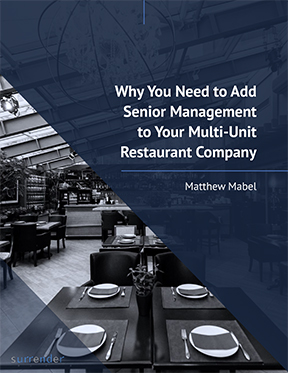
You can’t afford to have multi-unit supervisors just run the machine. That’s always true, but especially in volatile and uncertain times like these.
Instead of running the machine, your multi-unit supervisors must be building a better one.
Two Different Outcomes
For people who work in your company, do the alarms in their phones wake them up every morning to feel successful because they run great shifts and have made guests and employees happy?
If so, great! That’s a good outcome for operators.
Or does that alarm announce the start of another opportunity to improve your restaurants – and the processes used to operate them – to produce significantly better results?
If that’s the case, that’s an even better outcome for true leaders.
Two recent situations with my clients come to mind. At one, ownership had a creeping sensation that operations directors were not doing the right things – with eroding guest experience and profit as the evidence.
At another, where their first ever regional manager had risen from the ranks, the message they sent sounded like, “Just make sure everything goes well.” Ownership realized that no one had ever seen a state-of-the-art example of how to do that regional manager job.
How Do They Do That?
Success starts with a documented and transparent operating plan that addresses improvements in all areas of your business. Tie that to metrics that let you know when you have arrived.
And then, plan to do even more!
Next, multi-unit supervisors talk about it over and over and over again and measure success constantly with the managers they work with, and at least monthly when they do a one-on-one with their boss.
When an operations director walks into a unit and sees that a veteran server forgets to greet tables quickly enough, they correct that.
But until they treat the cause, and not just the symptom, their job remains incomplete. They then must think about training, education, manager presence in the dining room, what to change to have an ethos of better service, whether the competition does a better job, and more.
A regional manager who sees a slow lunch shift doesn’t just think about the weather and make sure someone posted on social media today; they think service and culinary execution.
An area director who reviews their P&L doesn’t just take notes on supply costs over budget or a miss on one category of labor; they reflect on the financial literacy of their managers and develop a program to make sure the people who work for them are identifying anomalies in the numbers before they are asked.
A State of Mind
Do your multi-unit supervisors spend their limited time making sure your restaurants run properly, or do they spend their time utilizing their superpower of making them run better than ever?

